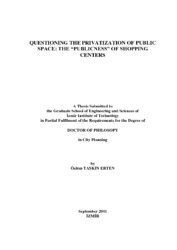Please use this identifier to cite or link to this item:
https://hdl.handle.net/11147/2899Full metadata record
| DC Field | Value | Language |
|---|---|---|
| dc.contributor.advisor | Özdemir, Semahat | - |
| dc.contributor.author | Taşkın Erten, Özlem | - |
| dc.date.accessioned | 2014-07-22T13:48:34Z | - |
| dc.date.available | 2014-07-22T13:48:34Z | - |
| dc.date.issued | 2011 | - |
| dc.identifier.uri | http://hdl.handle.net/11147/2899 | - |
| dc.description | Thesis (Doctoral)--Izmir Institute of Technology, City and Regional Planning, Izmir, 2011 | en_US |
| dc.description | Includes bibliographical references (leaves: 185-203) | en_US |
| dc.description | Text in English; Abstract: Turkish and English | en_US |
| dc.description | xiii, 246 leaves | en_US |
| dc.description.abstract | This study focuses on the transformative impact of privatization on public space and questions the theoretical debate on this transformation via testing the extents of 'publicness' of shopping centers. The research seeks to achieve two major objectives: The first is to determine the criteria that affect the level of publicness of a shopping center by means of a statistics-based quantitative study and to illustrate the influence of these criteria on the publicness of public spaces. The second is to question whether a model that will help assess the 'publicness' of a shopping center can be developed.The qualities that shape 'publicness' attributed to shopping centers are defined almost always with reference to users' relation to the space. Recent studies have argued that it is possible to measure the publicness and accessibility of public spaces. In contrast this study attempts to develop a novel quantitative framework which advances the methodologies of these studies and proposes the application of this framework to shopping centers as private places. The effective criteria used in the development of this quantitative framework in testing the 'publicness' of shopping centers are: 'interest', 'symbolic access', 'access to activities', 'access to resources', 'access to information', and 'physical access'. This quantitative framework was tested on two shopping centers in Izmir, Turkey: Forum Bornova Life and Shopping Center and Agora Shopping Center. During field research direct observation, interviews and a survey questionnaire directed at users were conducted on site. When the results of study were interpreted the level of publicness of these two shopping centers were seen to be different. Regarding each criteria mentioned above the two shopping centers were assessed to have 'high publicness' or 'low publicness' and the relationship between these criteria and publicness were observed. The study concludes with recommendations on how to increase the level of publicness of public spaces in cities and shopping center developments. | en_US |
| dc.language.iso | en | en_US |
| dc.publisher | Izmir Institute of Technology | en_US |
| dc.rights | info:eu-repo/semantics/openAccess | en_US |
| dc.subject.lcsh | Public spaces | en |
| dc.subject.lcsh | Shopping centers--Social aspects | en |
| dc.title | Questioning the Privatization of Public Space: the "publicness" of Shopping Centers | en_US |
| dc.type | Doctoral Thesis | en_US |
| dc.department | Thesis (Doctoral)--İzmir Institute of Technology, City and Regional Planning | en_US |
| dc.relation.publicationcategory | Tez | en_US |
| dc.identifier.wosquality | N/A | - |
| dc.identifier.scopusquality | N/A | - |
| item.openairecristype | http://purl.org/coar/resource_type/c_18cf | - |
| item.cerifentitytype | Publications | - |
| item.fulltext | With Fulltext | - |
| item.languageiso639-1 | en | - |
| item.grantfulltext | open | - |
| item.openairetype | Doctoral Thesis | - |
| Appears in Collections: | Phd Degree / Doktora | |
Files in This Item:
| File | Description | Size | Format | |
|---|---|---|---|---|
| 413585.pdf | DoctoralThesis | 4.58 MB | Adobe PDF |  View/Open |
CORE Recommender
Page view(s)
462
checked on Apr 28, 2025
Download(s)
292
checked on Apr 28, 2025
Google ScholarTM
Check
Items in GCRIS Repository are protected by copyright, with all rights reserved, unless otherwise indicated.